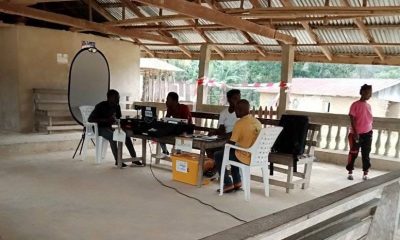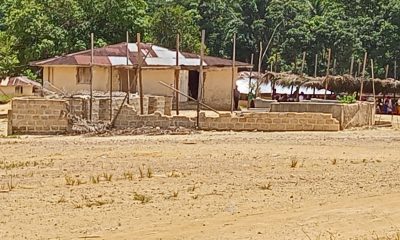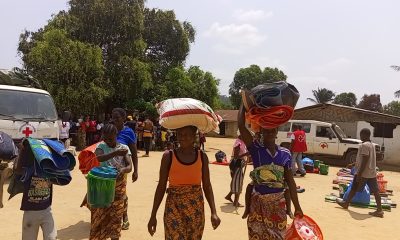Gbarpolu County – Locals of Gbarpolu County have described the New Community Health Services Policy as one of the best policies put together by the Ministry of Health (MOH). They made the disclosure during a policy dissemination orientation stakeholders meeting organized by the community health services division of the MOH.
The policy propagation took place on the 16th of September in Bopolu City. Speaking during the information sharing meeting, the traditional leader of the County, Quacy Gaum promised that the county will continue to work with the MOH to ensure that health services reach people across the county.
The traditional leader said the best way to disseminate the new health plan is by organizing district level stakeholders’ meetings in the six administrative districts in the county.
“We are gripping this massage, but please go in our entire district to our people with this same information, because they are suffering there, but it’s hard (difficult) for us to go there and know,” the chief said.
Also making a remark on behalf of local organizations, the Program Manager of the Youth in Action for the Prevention of HIV/AIDS, Jerry Karmo, expressed commitment to working for the attainment the policy which includes the implementation of the Community Event Based Surveillance.
“I know that we will work along with the county heath team to roll out the information to places where a support to go when the need be,” Karmo.
The community health program of Liberia has been revised under the government investment health plan, which aims at rebuilding a resilient health system in Liberia after the EVD outbreak.
Providing information on the new community health services policy of Liberia, the Director of the Community health Services Division of MOH, Tamba M. Boima, said the division has noticed that most pregnant women were dying from malaria, diarrhea, and malnutrition.
He named major causes of under-five and maternal death as the delay in accessing health care starting at the households’ level.
Boima said there were more community programs when NGOs were doing their own training for over 8,000 general community health volunteers, something which made supervising GCHVs a major problem.
He pointed out that about 1.2 million of the country’s population do not have access to any health services, which he said showed that these Liberians live beyond 5 Kilometer, and are more than one hour away from health facility.
He explained that under this new community driven policy, each county health team will work along their community to recruit Community Health Assistants (CHAs).
“These people will be train, maintained, and we will pay them, how much I can’t tell you because salary is confidential,” he said.
CHAs are expected to be equip to deliver needed and timely health care services at each household in hard to reach areas while cautioning citizens to make use of the “lives saving services in other to mitigate potential risks”.
Meanwhile, the County Health Officer (CHO) of Gbarpolu, Dr. Anthony Tucker admits that the new community health services policy will be tested with bad road conditions which will entails applying resilient efforts when implementing the plan in hard-to-reach villages.
CHO Tucker said there are challenges but he’s confident that international partners in the sector are determine to buttress government’s plan, while disclosing that there will be more recruitment of GCHVs.
The one day community health services policy stakeholder meeting was attended by cross session of the citizens, local NGOs and County health team partners as well as the joint security in Gbarpolu. It was supported by the Health Communication Capacity Collaborative (HC3).
According to the HC3 Social and Behavior Change Communication Program Officer, Thon L. Okanlawon, the NGO is supporting MOH’s county level community health services policy across the country.
“Our institution is involved into providing health information that will enable people to change their negative behavior to positive behavior,” Madam Okanlawon told locals at the meeting, adding that HC3 supports the Liberian government health investments plan.
Madam Okanlawo used the occasion and called on the people of Gbarpolu County to seize the opportunity by providing information to CHAs assigned in their respective communities.
“It is only the community that can be able to fight to help even the nation level to diseases within the community,” she said.
Report By: Henry Gboluma


Methodology

True
The claim is rigorous and the content is demonstrably true.

Half True
The statement is correct, although it needs clarification additional information or context.

Unproven
Evidence publicly available neither proves nor disproves the claim. More research is needed.

Misleading
The statement contains correct data, but ignores very important elements or is mixed with incorrect data giving a different, inaccurate or false impression.

False
The claim is inaccurate according to the best evidence publicly available at this time.

Retraction
Upon further investigation of the claim, a different conclusion was determined leading to the removal of the initial determination.

Toxic
A rude, disrespectful, or unreasonable comment that is somewhat likely to make you leave a discussion or give up on sharing your perspective. Based on algorithmic detection of issues around toxicity, obscenity, threats, insults, and hate speech;
































































































































































































































































































































































































































































































































































































